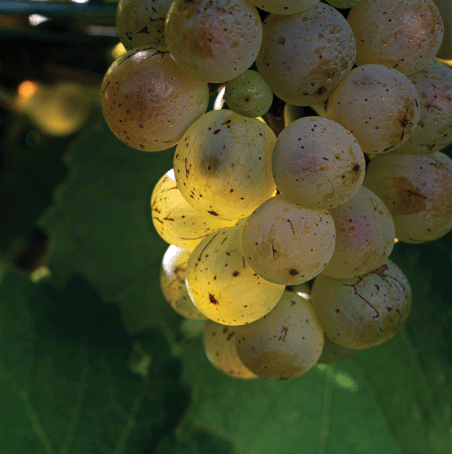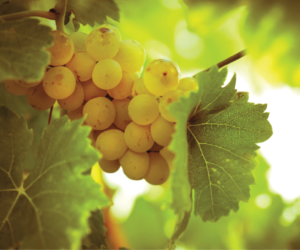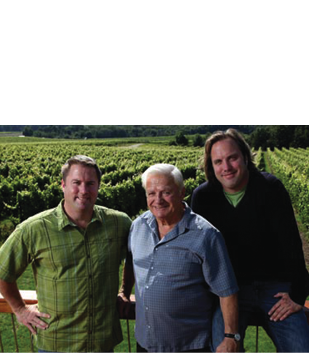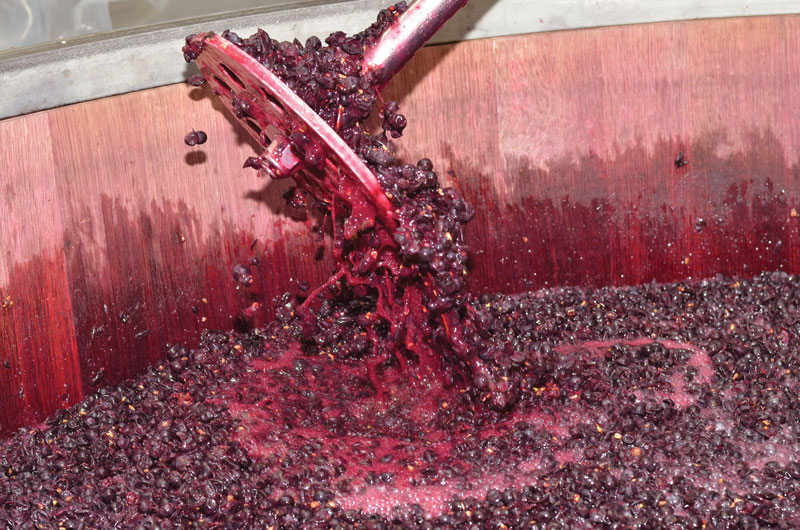
German wines, particularly great German Rieslings, are unlike any other wines in the world, with unmatched fruit intensity, striking minerality and remarkable aging potential. Once you’re hooked, you’re hooked, and soon the urge to make your own becomes a fixation. Here are some simple steps to get you there:
Find a 500-year old cellar, preferably one with walls covered by a thick layer of beneficial mold and bins already full of musty bottles of pre-WWII vintages. Ideally, this cellar would be underneath a fairy-tale castle, perched along a scenic river, surrounded by vineyards with a 50-degree slope and a warm, southern exposure. From there, it’s a snap.
If that’s not an option for you, find some healthy, low-cropped grapes from as cool a climate as you can and do as little as possible to them in your own cellar (which probably won’t have that lovely old mold). It won’t be wine from the Mosel, but it can still be wunderbar.
Tradition and Innovation
Since only a small amount of German wine makes its way to North America, it’s difficult to get a handle on the breadth and diversity of winemaking without spending some time there. The mix of tradition and innovation is remarkable to see, and the distinctions between regions come alive. It doesn’t take long to grasp why the Mosel, on the edge of the climate zone where grapes can ripen at all, makes wines that are so laser-like and special, or why the Pfalz, a little flatter and balmier, has the natural options available that make it the most dynamic German winemaking region.
The most important thing that North Americans are likely to miss about German wine is that the great majority of German white wines are made very, very dry. The classic off-dry style, where a certain amount of residual sugar is balanced by crisp acidity, has nearly disappeared in the German domestic market, and has survived since the mid-1980s primarily through exports to the U.S., Japan, Scandinavia and a few other destinations. Red wine production has also increased dramatically.
The change to drier whites has certainly not meant a wholesale rejection of tradition. German winemakers still know every square foot (sorry, square meter) of their vineyards better than anybody else on earth, and remain very particular about what should be grown where and even which rows of a vineyard block go into what style of wine.
Hundreds of years of trial and error — and more recent scientific studies at Geisenheim and the other wine research centers — have equipped German growers with a terrific array of proven, distinctive clones. And in many cases, cellars with pedigrees stretching back several centuries have built up resident populations of useful micro-organisms that are treasured even by modern winemakers.
Deciding Style
What all this has to do with you and your garage winery is this: if you’re out to make German-style wine, you need to decide what German style. In this article, we’ll focus on Riesling, though much of what follows applies as well to Muscat, Sheurebe, Sylvaner and other commonly-made German whites.
It’s hard to make good wine in a style you don’t know, and so if the dry (trocken) style of German Rieslings is unfamiliar, seek some out and try them. Like dry Muscat, dry Riesling retains all the wonderful, intoxicating aromatics that the sweeter versions exhibit. In addition, the potential for minerality in the mouth is enhanced in this dry white.
Most German winemakers I have talked to say that while wines with some residual sugar are more work to make, dry wines are harder to make well. Too much acid, not buffered with a touch of sugar, can make for a shrill wine; a bit of sweetness also helps fill out the body and mask slight imperfections in the wine. (Of course, no amount of sugar will camouflage truly bad wine.)
Aiming for an off-dry style means deciding whether to stop the fermentation early or to back-sweeten a wine that has fermented dry with some unfermented juice saved for the occasion. In either case, plan ahead.
The other major stylistic choice is whether you’re shooting for a wine to drink young or a wine that may take a few years to come around. The Germans call the simpler, fruitier types “summer wines,” destined for drinking in the first few months after release.
Such wines can be absolutely charming, and make you friends in a hurry. The main techniques that can promote structure and age-worthiness are skin and lees contact; summer wines, on the other hand, require squeaky clean winemaking.
Your main mantra should be to do no more than necessary. This is pretty much the Riesling recipe all over the world, but the Germans are probably the most fanatic about it. Most would echo Johannes Selbach, winemaker at Selbach-Oster in the Mosel, when he says, “The winemaking is nothing, the vineyard is the key.”
“Nothing” might be a little too strong, but the emphasis is well placed: Riesling winemaking should let the character of the grapes come through, not try to force them into some mold in the winemaker’s head.
Here are some things a good German-style winemaker would consider when making Riesling:
Grape ripeness
If you have control over when your grapes are picked, be aware that Riesling attains fully ripe flavors at sugar levels lower than many other white varieties. Sugar between 19 and 21 ºBrix is the normal range in good, cool-climate areas.
Germany, of course, doesn’t measure sugar in Brix, but uses instead the Öchsle (Erks-le) scale. A Brix range from 19 to 21 would translate into roughly 80 to 90 Öchsle — the numbers for full-bodied wines designated as spätlese in Germany.
Acid levels
Riesling thrives on high acidity, which brings out flavor, elevates aromatics, and makes the wines sing. Total acidity (TA) at harvest should be 8 grams per liter (g/L) or higher; 10 or
11 g/L is fine, since the acidity will drop during wine processing and since what seems like excess acidity can be balanced with residual sugar.
High acid means low pH; look for readings in the low 3s, even down to 2.9. Low harvest acidity or high pH — in Riesling terms — should be corrected with an addition of tartaric acid immediately after pressing.
Crushing and pressing
German winemakers debate the virtues of skin contact for Riesling grapes. Walter Strub in the Rheinhessen utilizes whole-cluster pressing for all his white wines, feeling that his wines have plenty of body without gaining more from skin contact.
This is probably the majority view among premium winemakers, who also fear that phenolic extraction from grape skins can get in the way of delicate Riesling flavors.
In the same growing region, Johannes Geil thinks that short skin contact (2–24 hours) after crushing improves the aging potential for Riesling, assuming that the grapes are fully ripe. In the Mosel, Martin Kerpen uses skin contact to help reduce the sharpness of unusually high-acid grapes, an advantage several winemakers mentioned.
If you have grapes, consider short-term skin contact, at cool (around 50 ºF/10 °C) temperatures as a method for increasing the stuffing and balancing the acidity of your Riesling. If you’re aiming for a fully fruity style, get that juice off the skins ASAP.
Yeast choices
Most German winemakers don’t worry much about selecting a yeast strain; spontaneous fermentations with the natural resident yeast population are the norm among small, artisanal winemakers.
Daniel Wagner, winemaker at Wagner-Stempel in the Rheinhessen, is typical in arguing that natural yeasts are essential for bringing out the character of “terroir wines.” On the other hand, Johannes Selbach is one of several winemakers I talked with who often employs a commercial strain with dry-style wines to make sure that fermentation goes through to completion.
Spontaneous fermentation in your garage winery is a risky business — the last thing you want in a crystalline Riesling is some funky by-product of rogue microbes. If you want to stay on the safe side, the yeast choices that are common in New World Riesling production are the same ones that get used in Germany, when commercial yeast gets used at all: VL1, QA23 and Epernay 2 lead the list.
Fermentation temperature
The watchword for Riesling production is to keep it cool at every phase of the process. During fermentation, most winemakers try to keep the temperature down around 12–16 ºC (54–60 ºF).
This range preserves fruit character and discourages malolactic fermentation. Jakob Schneider in the Nahe region prefers slightly higher temperatures, 17–20 ºC (63–68 ºF), feeling that fermenting too cold yields “too much fruit” and not enough character.
Barrel fermentation Many German wineries ferment certain lots in large, old, neutral wooden casks — not with any intention of picking up oak flavor, bit for an extra bit of rounding and mouthfeel.
Malolactic
Just say no, as the Germans do. The fatness of a malolactic fermentation runs at complete cross-purposes to good Riesling.
Lees contact German winemakers are fond of lees contact as a way of increasing flavor complexity and improving mouthfeel. Some practice lees stirring, some simply let the wine rest on the fine lees.
The number of rackings is usually kept to a minimum, to avoid aerating, oxidizing and “bruising” the wine; some wines never get racked at all, resting on gross lees right up until they are prepared for bottling. Summer wines get racked earlier and more often.
Blending
Nein. There may be an experimental, proprietary blend here and there, but German Riesling goes solo, and is not tarted up with a pinch of Muscat or Gewürztraminer, as sometimes happens in North America.
Residual sugar management
Although most German whites these days are made in the trocken style. “Dry” often includes a small pinch of residual sugar, necessary for balance. Under Germany’s legal definitions, trocken wines can contain as much as 9 g/L of sugar (just under 1%), and halbtrocken (medium-dry) wines can go up to 18 g/L.
German winemakers are divided over the merits of arresting fermentation through chilling and SO2 additions versus adding back some reserved grape juice (süssreserve) to sweeten a dry wine. For all the strength of opinion on both sides, tasting the difference is far beyond my mortal palate.
Even some winemakers who stop fermentations may fine-tune the result with a little süssreserve. Most home vintners rely on back sweetening and treatment of the wine with sorbistat to neutralize any renewed yeast activity.
Filtration
Most German Riesling goes through sterile filtration. Part of the reason is to ensure stability in residual sugar wines, part is to achieve brilliant transparency. Given the raging controversy in red wine circles about the allegedly damaging effects of filtration, I found it remarkable that the Germans weren’t worried in the least about stripping their delicate Rieslings.
Bottling
Riesling everywhere gets bottled early, somewhere between February and June of the year after harvest. Because low pH wines require less sulfur dioxide for microbial control, it’s easy to overdo it on a final SO2 addition before bottling — there’s a fine line between just enough and an amount that leaves sensory traces, a little burnt match on the nose.
It’s not unusual for German Rieslings to show a sulfur edge when very young; it will be long gone in a few years, when the wines come into their prime drinking age.
And then comes the fun part: aging. Riesling’s longevity is without peer among white wines, and the best German examples, fortified with a strong backbone of acidity, can outlive their winemakers. There’s no requirement that you hold your wines for decades, but you are likely to be rewarded with a wine that gets more interesting every year for a good long while.






